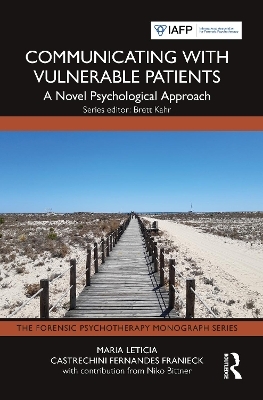
Communicating with Vulnerable Patients
Routledge (Verlag)
978-1-032-14042-1 (ISBN)
Leticia Castrechini-Franieck, also known as Maria Leticia Castrechini Fernandes Franieck, presents practical methods to overcome communication issues and engage therapeutically with highly vulnerable patients suffering from personality disorders, addiction, and trauma, as well as with deprived children. Communicating with Vulnerable Patients is presented in five parts, with Part one focused on building communication through a Transient Interactive Communication Approach (TICA) and Part two applying TICA in forensic settings with five case studies illustrating the approach in a range of contexts. Part three considers TICA in intercultural settings, including work with refugees, and Part four outlines adaptations of the approach, including T-WAS (Together We Are Strong), which aims to avoid an increase of antisocial behavior in deprived children, and the use of TICA in the COVID-19 pandemic. The book concludes in Part five with reflections on outcomes and limitations of both TICA and T-WAS.
Communicating with Vulnerable Patients will be invaluable reading for professionals, psychotherapists, group therapists, and group analysts working with at-risk populations.
Maria Leticia Castrechini Fernandes Franieck, PhD, is a chartered counselling psychologist and a psychodynamic psychotherapist based in Germany. Her clinical practice is focused on working with highly vulnerable populations.
List of Contributors
Series Editor's Foreword
Preface
Acknowledgements
Introduction
Part One: On building communication
Chapter 1: Handling, mastering, and integrating personal and factual reality
Chapter 2: On intercultural interactional communication
Chapter 3: TICA –Transient Interactive Communication Approach
Part Two: TICA in forensic settings
Chapter 4: TICA in withdrawal therapy
Chapter 5: TICA in pretrial detention
Part Three: TICA in intercultural settings
Chapter 6: TICA in short-term therapy with traumatized refugees
Chapter 7: TICA in multicultural team supervision
Part Four: TICA adaptations (variations)
Chapter 8: T-WAS- Together We Are Strong
with contribution from Niko Bittner
Chapter 9: TICA in the COVID-19 pandemic
with contribution from Niko Bittner
Part Five: Reflections on TICA
Chapter 10: Outcomes and limitations
| Erscheinungsdatum | 19.12.2022 |
|---|---|
| Reihe/Serie | The Forensic Psychotherapy Monograph Series |
| Zusatzinfo | 8 Tables, black and white; 13 Line drawings, black and white; 1 Halftones, color; 59 Halftones, black and white; 73 Illustrations, black and white |
| Verlagsort | London |
| Sprache | englisch |
| Maße | 156 x 234 mm |
| Gewicht | 680 g |
| Themenwelt | Geisteswissenschaften ► Psychologie ► Psychoanalyse / Tiefenpsychologie |
| Medizin / Pharmazie ► Medizinische Fachgebiete ► Psychiatrie / Psychotherapie | |
| ISBN-10 | 1-032-14042-9 / 1032140429 |
| ISBN-13 | 978-1-032-14042-1 / 9781032140421 |
| Zustand | Neuware |
| Haben Sie eine Frage zum Produkt? |
aus dem Bereich


